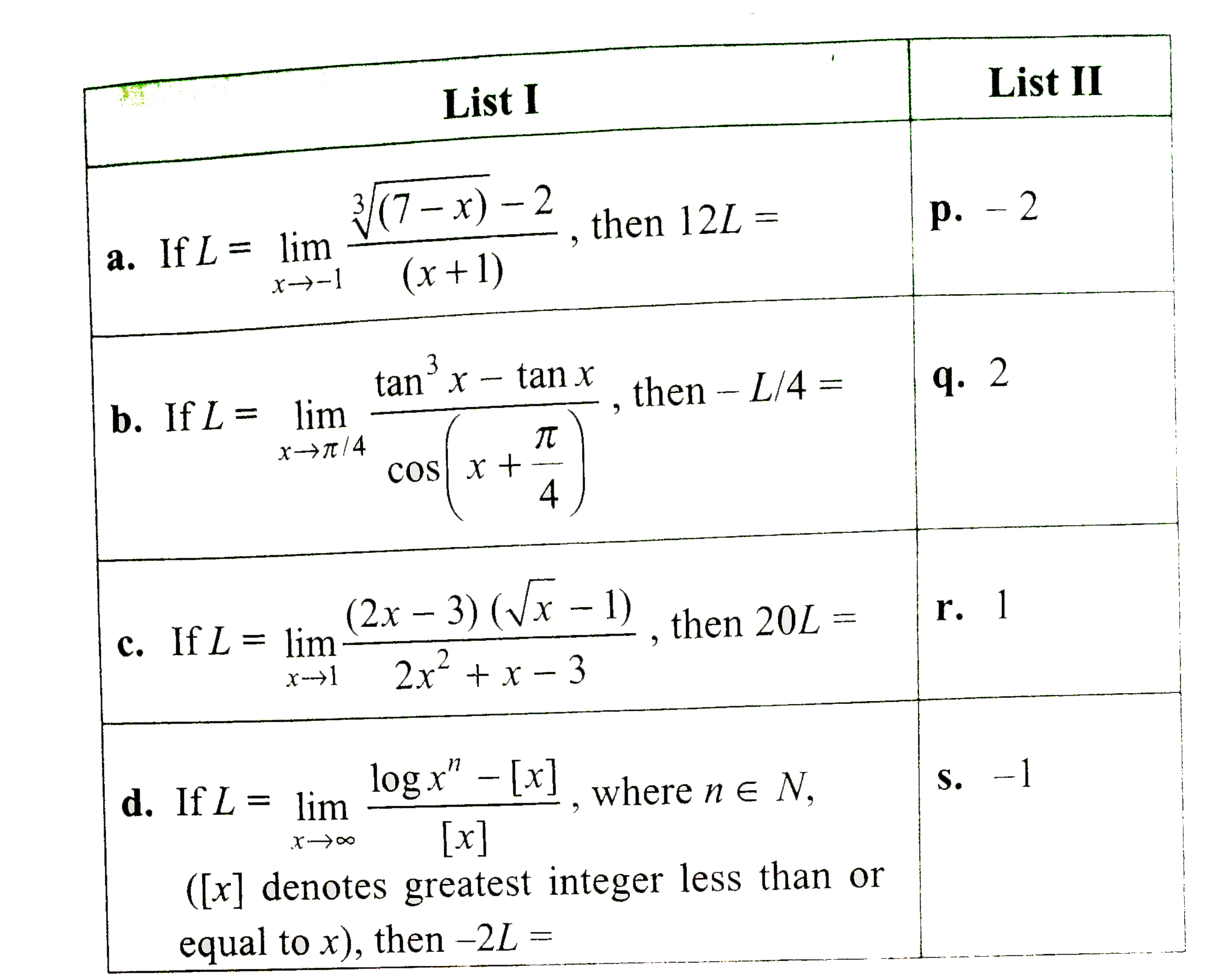The value of limx→∞(2xn)e1x−(3xn)e1xxn (where n∈N) isSolution in Bengali
e
0
e−1
1
The correct Answer is:B
L=limx→∞(2xn)e1x−(3xn)e1xxn=limx→∞(3)xnex((23)xnex−1)xn
Now, limx→∞xnex=limx→∞n!ex=0
(Differentiating numerator and denominator n times for L'Hospital's rule)
Hence, L=limx→∞(3)xnexlimx→∞((23)xnex−1)xnexlimx→∞1ex
=1×log(2/3)×0=0
Topper's Solved these Questions
- BOOK - CENGAGE PUBLICATIONCHAPTER - LIMITSEXERCISE - Linked Comprehension Type20videos
LIMITS
- BOOK - CENGAGE PUBLICATIONCHAPTER - LIMITSEXERCISE - Matrix Match Type5videos
LIMITS
- BOOK - CENGAGE PUBLICATIONCHAPTER - LIMITSEXERCISE - EXERCISE 2.88videos
LIMITS
- BOOK - CENGAGE PUBLICATIONCHAPTER - JEE 2019EXERCISE - Chapter 108videos
JEE 2019
- BOOK - CENGAGE PUBLICATIONCHAPTER - LINEAR COMBINATION OF VECTORS, DEPENDENT AND INDEPENDENT VECTORSEXERCISE - DPP 1.210videos
LINEAR COMBINATION OF VECTORS, DEPENDENT AND INDEPENDENT VECTORS
Similar Questions
Letf(x)=sin−1(1−{x})×cos−1(1−{x})√2{x}×(1−{x}), where {x} denotes the fractional part of x.
L=limx→0−f(x) is equal to07:00View SolutionMatch the following lists:
 02:46View Solution
02:46View SolutionEvaluate limx→1cosπ2x1−√x
05:43View SolutionIf y = y(x) is the solution of the differential equation, xdydx+2y=x2 satisfying y(1) = 1, then y(12) is equal to
02:40View SolutionThe number of integral values of p for which (p+1)ˆi−3ˆj+pˆk,pˆi+(p+1)ˆj−3ˆk and −3ˆi+pˆj+(p+1)ˆk are linearly dependent vectors is q
05:55View SolutionThe value of limx→∞(2xn)1ex−(3xn)1exxn (where n∈N) is (a)logn(23) (b) 0 (c) nlogn(23) (d) none of defined
04:42View SolutionIf A(n) represents the area bounded by the curve y=n⋅lnx ,where n∈Nandn>1, the x-axis and the lines x=1andx=e, then the value of A(n)+nA(n−1) is equal to a.n2e+1 b. n2e−1 c. n2 d. en2
01:58View Solutionlim_(x rarr oo)((2^(x^(n)))^(e^((1)/(T)))-(3^(x^(n)))^((1)/(e^(bar(T)))))/(x^(n))
04:23View SolutionThe value of lim_(x rarr oo)((2^(x^(n)))^((1)/(e^(x)))-(3^(x^(n)))^((1)/(e^(x))))/(x^(n))
07:13View SolutionThe value of lim_(x rarr oo)(x^(n)+nx^(n-1)+1)/(e^(|x|)),n in1 is
04:47View Solutionlim_(x->oo)(e^x((2^(x^n))^(1/(e^(x)))-(3^(x^n))^(1/(e^(x)))))/(x^n), n in N, is equal to
05:32View Solutionlim_ (x rarr1) (nx ^ (n + 1) -nx ^ (n) +1) / ((e ^ (x) -e ^ (2)) sin pi x)
04:25View SolutionThe value o limx→∞(1n3)([12x+12]+[22x+22]+…..+[n2x+n2]) is where [.] denotes the greatest integer function.
03:04View SolutionThe value of limx→∞(2xn)1ex−(3xn)1exxn (where n∈N) is (a)logn(23) (b) 0 (c) nlogn(23) (d) none of defined
07:44View SolutionThe value of limx→∞(2xn)e1x−(3xn)e1xxn (where n∈N) is
03:20View Solution

